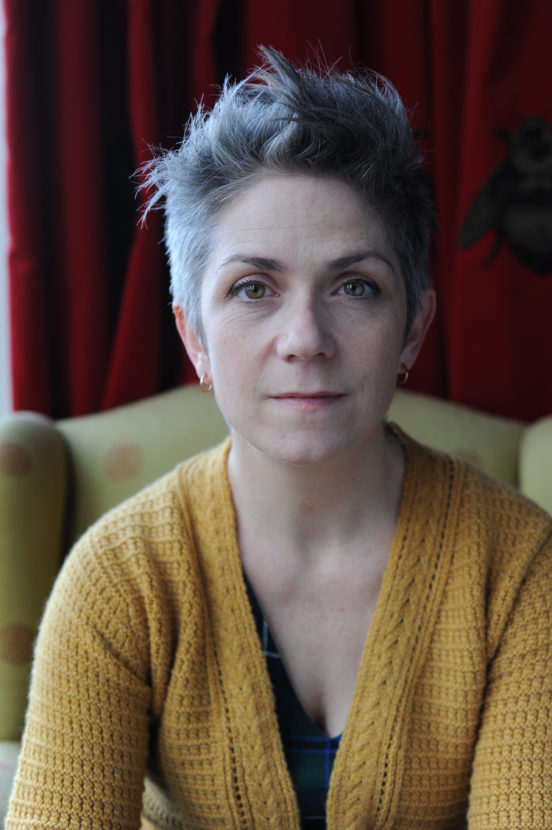
In this version of twenty questions, I send a list of questions to a willing author and they choose their own interview by handpicked which questions (and how many!) they want to answer. Denise Mina is the author of Red Road, the fourth book in her Scottish detective series featuring Alex Morrow. Here is what Denise had to say about reading, writing, and taking the reader into a different world.
Would you give us a bit of introduction and let my readers know who you are, how you got started as narrator, and what kind of books you like to work on?
I’m a Scottish woman who lucked out! I started as an incompetent legal academic, doing a PhD in The Ascription of Mental Illness to Female Offenders. I realised that I’d probably spend the rest of my life trying to get people to listen to the things I’d discovered and I’m not that pushy. To be an academic you have to really sell yourself and I’m not the best at that. So, I started writing a crime novel with all of the ideas in it, thinking that people would read for the mystery but come across all of the ideas in there. That book was Garnethill.
The books I like to work on have pace and take the reader into a different world that they having imagined before. I like heroes and heroines that are unexpected: psychiatric patients, rude women, the fat girl in the office.
I am often struck by the different ways books can be interpreted by who read and how they read it.Can you share with us any routines, food or recipes, or favorite books or rituals that help you get into character, and prepare to read narrate a book?
Honestly, I’ve got kids, a lot of elderly relatives and a man who couldn’t find his arse with both hands so I don’t have time for routines or rituals. I just look at the calendar, weep softly and get on with it. Panic is a good motivator. Working in the morning is good too: there’s a period of about two hours just after I’ve woken up when I don’t have a head full of other things, so I often get up a couple of hours before everyone else and work then.
Write the question you would most like to answer in an interview, and then answer it.
Does being lauded as a writer make you feel like a bit of a phoney?
All the time. I see other writers talk about their work with total certainty and confidence. Maybe they don’t feel that way but I can’t even put it on. I always think of Philip Larkin and Ted Hughes. Larkin was constitutionally questioning and Hughes was certain. I feel like Larkin. I wake up a little bit embarrassed. I used to be embarrassed about feeling embarrassed but now I think of it as the ability to have two feelings at the same time. It’s my super power.
What was the most interesting thing that you’ve found out while preparing to read a book that you’re working on?
Reading a lot of the research on women who marry men in prison or on death row for Deception. The dynamic in those relationships mirrors that between fan and pop stars: you can be completely over the top because you’ll never meet really, it’s the distance that causes the erotic tension. There’s a great book about Australian women who married men in prison and followed them after they got out. Terrifying! One guy took all of his wife’s teeth out to punish her.
In the past I have visited a blog called Daily Routines and it’s all about the schedules of writers and creative people. What does a typical day look like for you and how do you manage a busy schedule?
I get up before the kids and write for one or two hours before they get up. Then an hour and half of nagging, feeding, shouting, walking and get everyone to school. Then back to the desk, re read what I’ve done, decide what I’m going to do today. Batter into it. By about 11 am my concentration is fading and I spend about an hour and a half refusing to admit it has. I check my email, facebook, twitter. I empty the dishwasher. I sweep the hall.
Then I give up and have lunch early. Then I come back, work for a bit more, set out the work for the session and get on with interviews, admin, phone calls etc. The kids get out of school at three o’clock so I usually think of something great at 2:30, just as I have to set off. Jot it down, go get the kids. Get everyone back home, feed, nag, homework, nag. If I have child care which is about two afternoons a week I sit down and work until 5.
How jaw dropping dull is all of that?
What were your experiences with reading when you were growing up? Was there a pivotal moment in discovering literature when you knew that you wanted to work in the publishing industry in this capacity? In any capacity?
I moved around Europe a lot when I was a kid and didn’t really learn to read until I was about eight. I couldn’t write until I was nine and wasn’t academic at all.
When I was nineteen I went on a girls-gone-wild holiday to Greece with waitresses I worked in a coffee shop with. I honestly thought we were going to look at churches but, well, there was a misunderstanding of epic proportions. One of the girls had brought these books: One Hundred Years of Solitude and The Master and Margerita.
I sat on the roof for a solid week and read. Best holiday I’ve ever had. Best tan too.
I read obsessively after that. I remember reading Zola and Dickens and thinking how wonderful it would be to write a book that would touch someone the way they had touched me.
What’s next?
I’m finishing a book just now called Any Man’s Death, writing the graphic adaption of The Girl who Kicked the Hornets Nest, Judging the Bailey’s Prize for women’s literature, editing a graphic novel for the Edinburgh International Book Festival and promotion a short film I made with my cousins called Multum in Parvo (Translation: Much in Little). The film was a documentary we made of our parents being interviewed talking about growing up one of fifteen in a four bedroom house. Then we showed it to the extended family in a cinema in Glasgow and filmed them watching themselves.
About the Author: After a peripatetic childhood in Glasgow, Paris, London, Invergordon, Bergen and Perth, Denise Mina left school early. Working in a number of dead-end jobs, all of them badly, before studying at night school to get into Glasgow University Law School. Denise went on to study for a PhD at Strathclyde and misused her student grant to write her first novel Garnethill. Denise has written twelve novels, three plays, five graphic novels and regularly contributes to television and radio in the UK.



